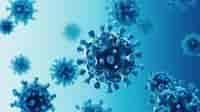Bacteria and viruses are entirely different
Bacteria are living organisms, whereas viruses need a host cell to reproduce. Bacteria can therefore be treated with antibiotics, whereas a viral infection is difficult to treat with medication.
Bacteria and viruses each have their own way of making us ill; other than that, they have absolutely nothing in common. Bacteria are microscopically small single-cell living organisms with their own metabolism and the ability to reproduce. If too many bacteria get into the human body, they can make us ill, and at worst, result in death. Antibiotics are used to inhibit their progress.
Viruses by comparison have a very simple structure and, strictly speaking, are not living organisms.
Key distinctive features of bacteria and viruses
- Size: Bacteria are much larger than viruses.
- Structure: Viruses have a very simple structure. They do not have their own cells, nor do they have their own metabolism. Strictly speaking, they are not living organisms. Bacteria are very much living organisms. They have a proper cell wall and an internal structure.
- Reproduction: Viruses cannot reproduce by themselves. They invade human cells and use them as a host - without this, they die. Bacteria reproduce independently, by cell division.
- Disease transmission: Viruses and bacteria make us ill in different ways. Viruses destroy cells in our body. Bacteria cause damage, for example, through toxic metabolic by-products.
- Treatment: A bacterial infection is treated with antibiotics. They attack the bacteria’s structures, ensuring they are destroyed. In comparison, viruses are difficult to treat with medication. Antibiotics are useless as viruses do not have their own metabolism or cell wall. Specific antivirals are only effective against individual virus types. If our body's own defences succeed in combating the virus, we often become immune and can no longer be infected by the pathogen.
Another major difference between viruses and bacteria is that not all bacteria make us ill; some bacteria are vital to human life.
Image: Image of viruses (above) and bacteria (below)
Why we still need bacteria
The human body has approximately 15 times more bacteria than its own cells. That’s a total of around 100 billion bacteria. Bacteria are essential for life, particularly for our digestive system which simply would not be able to function without them. Our gut is home to particularly large numbers of bacteria. Their presence aids the production of acids, fats and various vitamins. As an example, Vitamin B12, which is extremely important for the body, can only be produced by gut bacteria.
Bacteria are therefore simply an essential part of our lives.
References:
- https://www.nhs.uk/conditions/sore-throat/
- Ebell MH, et al. JAMA 2000;284:2912–8
- https://www.nhsinform.scot/illnesses-and-conditions/ears-nose-and-throat/sore-throat#treating-a-sore-throat
- https://www.healthline.com/health/sore-throat
- https://www.nhsinform.scot/illnesses-and-conditions/ears-nose-and-throat/sore-throat#treating-a-sore-throat


